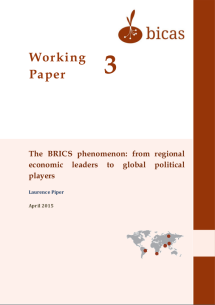In economic terms the paper traverses accounts of the future dominance of the BRICS of the global economy in GDP and growth terms; including the question whether there is more to the BRICS than the rise of China; whether other conceptions of emerging markets might be more useful; and what kind of shifts in the spatial patterns of extraction, production and consumption of global capitalism are signaled by the rise of the BRICS.
In political terms the BRICS have breathed life into their conception by Goldman Sachs as an investment meme, meeting regularly since 2009 to construct an alternative form of global economic governance to the traditional centres of the west.
Most profoundly manifest in new economic institutions that rival the IMF and World Bank, the BRICS also share a conception of development that is more partnership-orientated than donor-recipient focused in process, and more infrastructure and energy orientated than the social and governance focused in substance.
Lastly, the rise of the BRICS as economic and political players on the global stage raises questions about the extent to which they advance neo-liberal capitalism by serving as sub-imperialists in the regions, or offer more state-centric models of capitalist growth that open up the possibility of more inclusive development paths.
A related debate is whether the rise of the BRICS is good for their regions or just the leading states of those regions. Lastly, the emerging shifts in global capitalism and economic governance signaled by the rise of the BRICS suggests we are the beginning of the end of the utility of the North-South distinction as differences with countries come to be as important as differences across countries.

